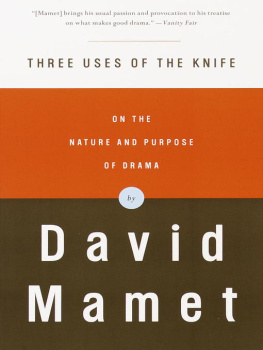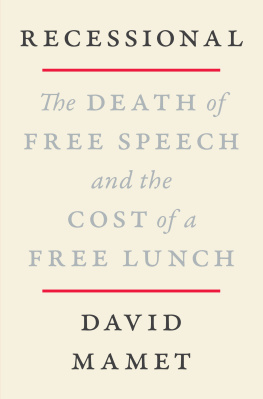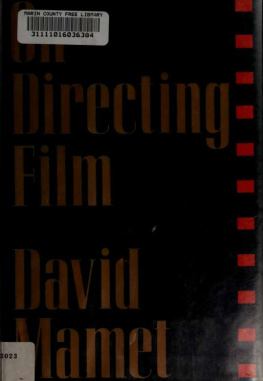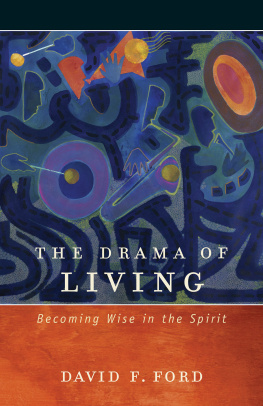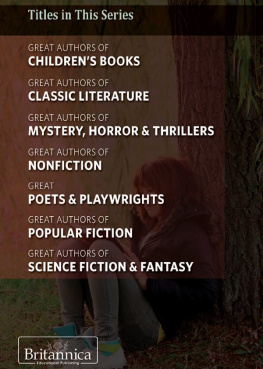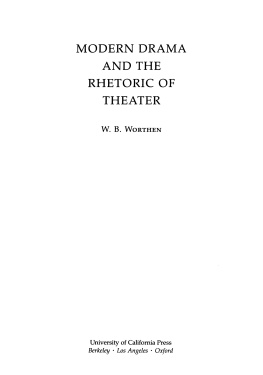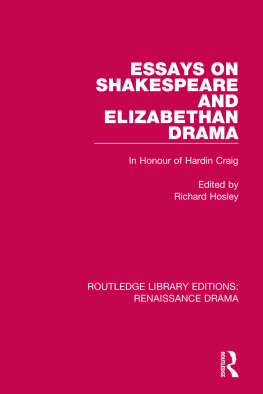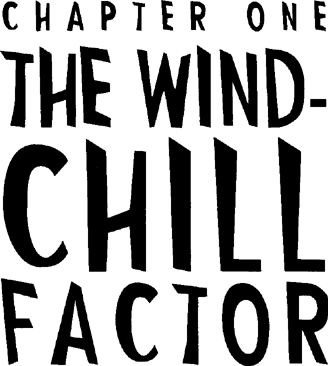ALSO BY DAVID MAMET
PLAYS
Boston Marriage The Old Neighborhood The Cryptogram Oleanna Speed-the-Plow Bobby Gould in Hell The Woods The Shawl and Prairie du Chien Reunion and Dark Pony and The Sanctity of Marriage The Poet and the Rent Lakeboat Goldberg Street Glengarry Glen Ross The Frog Prince The Water Engine and Mr. Happiness Edmond American Buffalo A Life in the Theater Sexual Perversity in Chicago and The Duck Variations
FICTION
The Village The Old Religion
NONFICTION
True and False The Cabin On Directing Some Freaks Make Believe Town Writing in Restaurants
SCREENPLAYS
Oleanna Glengarry Glen Ross Were No Angels Things Change (with Shel Silverstein) Hoffa The Untouchables The Postman Always Rings Twice The Verdict House of Games Homicide Wag the Dog The Edge The Spanish Prisoner The Winslow Boy
IT is in our nature to dramatize. At least once a day we reinterpret the weatheran essentially impersonal phenomenoninto an expression of our current view of the universe: Great. Its raining. Just when Im blue. Isnt that just like life?
Or we say: I cant remember when it was this cold, in order to forge a bond with our contemporaries. Or we say: When I was a lad the winters were longer, in order to avail ourselves of one of the delights of aging.
The weather is impersonal, and we both understand it and exploit it as dramatic, i.e., having a plot, in order to understand its meaning for the hero, which is to say for ourselves.
We dramatize the weather, the traffic, and other impersonal phenomena by employing exaggeration, ironic juxtaposition, inversion, projection, all the tools the dramatist uses to create, and the psychoanalyst uses to interpret, emotionally significant phenomena.
We dramatize an incident by taking events and reordering them, elongating them, compressing them, so that we understand their personal meaning to usto us as the protagonist of the individual drama we understand our life to be.
If you said, I waited at the bus stop today, that probably wouldnt be dramatic. If you said, I waited at the bus stop for a long time today, that might be a little more dramatic. If you said, The bus came quickly today, that wouldnt be dramatic (and there would really be no reason to say it). But you might say, Do you know how quickly that bus came today?and all of a sudden, were taking the events of life and using dramatic tools.
I waited half an hour for a bus today is a dramatic statement. It means: I waited that amount of time sufficient for me to be sure you will understand it was too long.
(And this is a fine distinction, for the utterer cannot pick a time too short to be certain that understanding is communicated, or too long for the hearer to accept it as appropriateat which point it becomes not drama but farce. So the ur-dramatist picks unconsciously, and perfectly, as it is our nature to do, the amount of time that allows the hearer to suspend his or her disbeliefto accept that the half-hour wait is not outside the realm of probability, yet is within the parameters of the unusual. The hearer then accepts the assertion for the enjoyment it affords, and a small but perfectly recognizable play has been staged and appreciated.)
This is only the third time in NFL history a rookie previously benched with what was believed to be a serious injury returned to rush for more than 100 yards in a post-season game.
That NFL statistic, like the wait for the bus, takes the unremarkable and frames it to afford dramatic enjoyment. The ejaculation What a run! is given a statistic to allow us to savor it better/longer/differently. That run is assigned the dramatic weight of the incontrovertible.
Take the useful phrases you always and you never. In these we reformulate the inchoate into the dramatic. We exploit the utterance and give it dramatic form, for some personal benefit. We might gain transcendence over our significant other, as in the case of you always and you never. We might open a dinner table chat with a nice topic of conversation: I waited half an hour for a bus today.
In these small plays we make the general or the unremarkable particular and objective, i.e., part of a universe our very formulation proclaims understandable. Its good dramaturgy.
Bad dramaturgy can be found in the palaver of politicians who have somewhere between nothing much and nothing to say. They traduce the process and speak, rather, of the subjective and nebulous: they speak of the Future. They speak of Tomorrow, they speak of the American Way, Our Mission, Progress, Change.
These are mildly or less mildly inflammatory terms (they mean Rise Up, or Rise Up and Rush Around Boldly) that stand in for drama. They are placeholders in the dramatic progression, and they function similarly to sex scenes or car chases in a trash filmthey are related to no real problem and are inserted as modular treats in a story devoid of content.
(We may assume, similarly, that as Democrats and Republicans respond to each others positions by screaming scandal, their positions are essentially identical.)
We can see the natural dramatic urge in newspaper quotes of a films grosses. The dramatic urgeour impulse to structure cause and effect in order to increase our store of practical knowledge about the universeis absent in the film itself, but emerges spontaneously in our proclamation of a naturally occurring drama between films. Just as, when we have exhausted our interest in Zeus, we spontaneously create the pantheon.
Some say the land is growing hotter. No, say the others, it is not, and your senses are at fault. And, so, we have the wind-chill factor. Since we cannot wish away our anxiety about climate change, we dramatize it, transforming even that (one would think) least personal, most scientific measurement, the temperature, exactly as we dramatized our wait at the bus stop.
I need to feel maligned, so I say, And the damn bus was One Half Hour Late! I need to feel other than anxious, so I say, The temperature may be hotter than normalbut, with the wind-chill factor
(Please note that this is a rather elegant dramatic device, for the wind does not blow at the same speed all the time, and can be tempered by ones position in or out of its path. The factor allows one to suspend ones disbelief for the pleasure it affords.)
When the contents of the film or the decisions of the legislature do not satisfy (i.e., do not still our anxiety, do not offer hope), we elaborate their arid action into a superstoryjust as the creation myth is superseded by the pantheon, internecine battles replacing primordial being/nothingness anomie. (If we watch any television drama long enough, the Clinton White House, or Hill Street Blues, or ER, we will see the original dramatic thrust give way to domestic squabbles. After a while, the new is no longer new, and we require drama. Its how we perceive the world.)
Our survival mechanism orders the world into cause-effect-conclusion.
Freud called music polymorphous perversity. We take pleasure in the music because it states a theme, the theme elaborates itself and then resolves, and we are then as pleased as if it were a philosophical revelationeven though the resolution is devoid of verbal content. Like politics, like most popular entertainment.
Children jump around at the end of the day, to expend the last of that days energy. The adult equivalent, when the sun goes down, is to create or witness dramawhich is to say, to order the universe into a comprehensible form. Our sundown play/film/gossip is the days last exercise of that survival mechanism. In it we attempt to discharge any residual perceptive energies in order to sleep. We will have drama in that spot, and if its not forthcoming we will cobble it together out of nothing.

